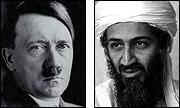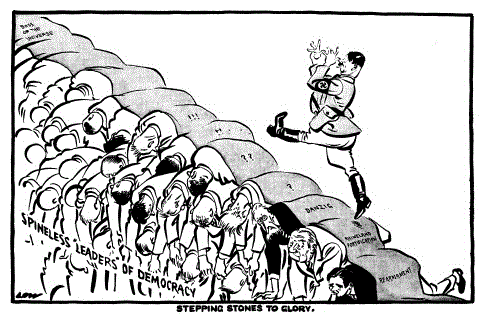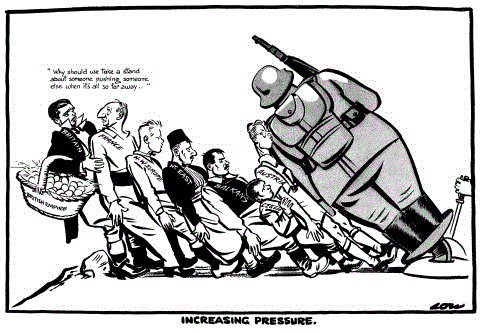|
| |
|
England footballers give the Nazi salute before a match in Germany in 1938 - a picture from German photograph archives
|
|
1. Why Appeasement?
If only…we could sit down at a table with the Germans and run through all their complaints and claims with a pencil, this would greatly relieve all tension. Chamberlain, speaking unoffficially to Anthony Eden in 1937.
You have only to look at the map to see that nothing we could do could possibly save Czechoslovakia from being overrun by the Germans. Chamberlain, writing to his sister in 1938.
How horrible, fantastic, incredible it is that we should be digging trenches and trying on gas-masks here because of a quarrel in a far away country between people of whom we know nothing. Chamberlain, speaking in a radio broadcast about the Sudetenland crisis, 27 September 1938.
A clever plan of selling off your friends in order to buy off your enemies. A comment in the British newspaper, The Manchester Guardian, February 1939.
Nowadays, when we use the word 'appeasement', we take it to mean: 'giving in to a bully'. Consequently, many people have criticised Chamberlain for appeasing Hitler. This is not quite fair, because in the 1930s, the word 'appeasement' meant what we would today call 'negotiation'; Chamberlain, realising that 'collective security' had failed, tried to negotiate peace with Hitler. There were many reasons why Britain 'appeased' Hitler in the 1930s. Historians have ascribed every possible motive to Chamberlain - sheer abject cowardice, that he was duped by Hitler, that it was a noble attempt to prevent bloodshed, that he was buying time for Britain to re-arm... and many others!
The five most important reasons, however, were:
(To see a full list of 19 possible reasons, click here.)
|
Going DeeperThe following links will help you widen your knowledge:
YouTube Why Appeasement? - BBC 20thC History
Why Appeasement? - a very simple exercise to get you started 19 reasons for appeasement - a full list of reasons why Britain appeased Hitler. Reasons for Appeasement - a game to help you find out what evidence there is for the different reasons for appeasement. Who started appeasement? - was Chamberlain solely to blame?
Consider:Look at the five most important reasons why Britain appeased Hitler. For each, discuss with a partner WHY this might have led Chamberlain to feel that he needed to give way to Hitler's demands.
|
2. Opinions of Appeasement?
Terrorists see negotiations as a sign of weakness and a lack of resolve. Though the 'peace protestors' mean well, they... are the same type of people who sought to appease Adolf Hitler. A modern American on the web at http://www.9-11justice.org/ He was writing after the Al-Qaeda atrocity in America which destroyed the World
Trade Centre, killing nearly 3000 people
In the 1930s, there were some people – most notably Winston Churchill – who opposed his policy. But at the time, most people thoroughly agreed with Chamberlain, and praised him. |
Was Appeasement Wrong? - a very simple exercise to get you started
|
Source AGive thanks to your God. Your children are safe. Peace is a victory for all mankind. If we must have a victor, let us choose Mr Chamberlain. A comment in The Daily Express, about the Munich agreement, October 1938.
|
Source BIt is a total defeat. Czechoslovakia will be swallowed up by the Nazis. And do not suppose that this is the end. This is only the beginning. Churchill, speaking about the Munich Agreement in 1938. |
|
|
◄ Source CThis cartoon by the British cartoonist David Low appeared in the Evening Standard newspaper in July 1936. Hitler goose- steps across the ‘spineless leaders of democracy’. The first 3 steps are labelled ‘Rearmament’, ‘Rhineland’ and ‘Danzig’. Click here for the interpretation |
|
◄ Source DThis cartoon of February 1938 by the British cartoonist David Low shows Germany crushing Austria. Next in line is Czechoslovakia. At the back, Britain says to France, who is next-to-last: ‘Why should we take a stand about someone pushing someone else when it’s all so far away?’ Click here for the interpretation
Consider:1. Study Sources A-D and list four things British people thought about Appeasement. 2. Which of Sources A–D suggest Hitler would carry on as long as people kept appeasing him?
|
|
Source EEIGHT RESULTS OF APPEASEMENTHistorians have said that appeasement:
|
Consider:Using Sources A–E make a list of 'points for' and points against' the policy of appeasement.
|
|
You can follow my students' first 'Gr8 Appeasement Deb8' by clicking HERE. Also, the famous author John Simkin and I recently had a vigorous debate about Chamberlain's appeasement which you can read by clicking HERE. And what do YOU think about appeasement? To make your own contribution to this debate,
| |
|
|
|
| |
 Who in their right mind believes we should even try
to placate the monsters responsible for the atrocities of September
11th, 2001?
Who in their right mind believes we should even try
to placate the monsters responsible for the atrocities of September
11th, 2001?
